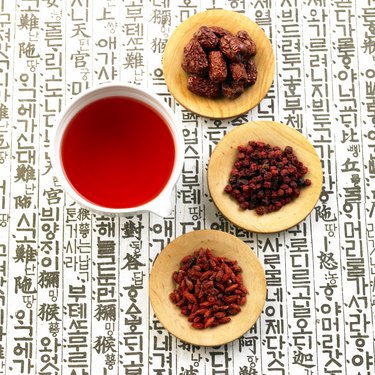
Jujube, which is sometimes referred to as the Chinese date, is a type of fruit that has been part of the Chinese diet for nearly 2,000 years, according to the Institute for Traditional Medicine. Jujube fruit is also consumed as a tea. While the research is limited, jujube tea is rich in antioxidants and may alleviate constipation. It's also purportedly beneficial for anxiety and insomnia, but the evidence is limited. Consult your doctor about the use of jujube tea for medicinal purposes before adding it to your diet.
Antioxidant Activity
Video of the Day
While nutrition information for the tea isn't available, the fruit, which is used to make the tea, contains some vitamin C plus phenols and flavonoids. These nutrients are known antioxidants that protect cells against free radicals, which are substances that cause damage and may be partly responsible for aging, as well as chronic diseases such as heart disease and cancer.
Video of the Day
Treatment for Constipation
A study published in 2008 in the Journal of Agricultural and Food Chemistry tested the effects of jujube tea on gastrointestinal transit time and fecal matter in hamsters. The researchers found that the tea not only improved intestinal transit time, but also reduced the ammonia level in the feces, which the researchers concluded may reduce intestinal exposure to toxic substances. However, human studies need to be conducted before claims can be made.
Lack of Evidence for Anxiety
Jujube is often recommended as a form of treatment for anxiety. Although the tea has not been studied, researchers have investigated the anti-anxiety effects of an extract made from the seed of the fruit on rats. A study published in 2000 in the Journal of Ethnopharmacology found that the extract reduced anxiety in the rats. However, the components in the extract that reduced anxiety may not be present in the tea, and until research is conducted on humans, claims cannot be made.
Lack of Evidence for Insomnia
Some may also drink jujube tea to help improve sleep. The study from the Journal of Ethnopharmacology noted that an increase in the amount of the seed extract also promoted sleep in the rats. However, a 2012 review article published in Sleep Medicine Reviews analyzed data from a variety of studies on the effects of Chinese herbal medicine on insomnia and found that none were effective, either in singular form or when part of an herbal formula. This review study did not look at jujube alone, but as part of a blend, and it did not study jujube tea.
- Institute for Traditional Medicine: Jujube
- Journal of Agricultural and Food Chemistry: The Jujube (Ziziphus Jujuba Mill.) Fruit: A Review of Current Knowledge of Fruit Composition and Health Benefits
- Journal of Agricultural and Food Chemistry: Effects of Water-Soluble Carbohydrate Concentrate From Chinese Jujube on Different Intestinal and Fecal Indices
- Sleep Medicine Reviews: Chinese Herbal Medicine for Insomnia: A Systematic Review of Randomized Controlled Trials
- Journal of Ethnopharmacology: Anxiolytic Effect of Seed of Ziziphus Jujuba in Mouse Models of Anxiety
- Harvard School of Public Health: Antioxidants: Beyond the Hype
- Drugs.com: Jujube